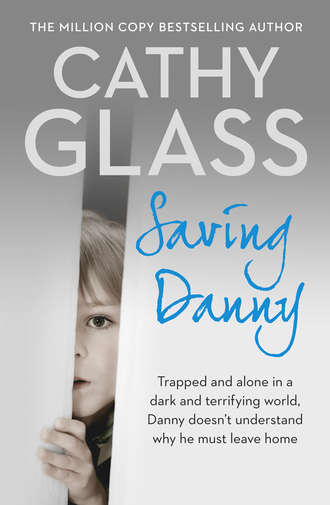
Полная версия
Saving Danny
‘So do I,’ Reva said a little brusquely. ‘But it’s different at school. There are other children here and Danny has respect for you. At home it’s just him and me, and he doesn’t have respect for me. He does what he wants, and if he won’t talk to me there is nothing I can do about it.’
‘Does he talk to your husband?’ Terri asked.
‘Sometimes, a little. But he only sees him for a few minutes in the evening, and at the weekends, when Richard’s not playing golf. Danny doesn’t talk like other children his age do. He doesn’t have a conversation; he repeats what you say or nods or comes out with half-sentences and words that don’t make any sense. Then he gets frustrated because you don’t understand what he wants, and that leads to a tantrum. Yet he can talk to George or himself. Danny would rather talk to himself or his rabbit than to me.’
‘Does Danny smile or laugh or show his feelings?’ Terri asked.
‘Not often. His expression is usually blank. Sometimes he’ll suddenly laugh but it’s not at the right time or in the right context, if you know what I mean. He can laugh loudly – cackle – for no obvious reason. He does it in public. It’s so embarrassing. It’s impossible to know if Danny is happy or not, and he doesn’t show physical affection normally. He’ll let you touch him sometimes, but only on his terms. He let me hold him in the playground just now and carry him into school, but I can’t remember the last time he let me cuddle him. It’s as though he doesn’t want or need anyone else. Not even his mother.’
‘I’m sure he does need you,’ I said. ‘But he has difficulty showing it.’
Terri and Sue nodded in agreement.
‘But other children kiss and hug their mothers,’ Reva blurted, her eyes filling again. ‘I’ve seen them in the playground kissing and hugging their parents goodbye when it’s time to go into school. Danny just turns and walks away with his classroom assistant. She has to tell him to say goodbye to me. He shouldn’t need telling. Other children don’t, but Danny seems to have no empathy or feelings. If I cry in front of him, he just looks at me.’ Reva was in tears again.
‘I’m sure Danny does feel things,’ Terri said seriously, looking at Reva, ‘just as you and I do, but the difference is Danny can’t express them. It’s a trait of autism, if that is what Danny has.’
‘And he does love you, just as other children love their parents,’ I added, trying to console Reva.
‘How can you be so sure?’ she demanded, taking another tissue from her bag. ‘You’ve only just met Danny. Wait until you know him better, you’ll see. He’ll be as cold to you as he is to me.’
I didn’t reply. Reva was very upset and didn’t mean to be rude.
‘Sorry,’ she said after a moment.
‘It’s OK,’ I said. ‘I can appreciate how upsetting Danny’s behaviour is for you.’
‘Have you fostered anyone like him before?’ Reva now asked, wiping her eyes.
‘No two children are the same,’ I said. ‘But I have seen some of Danny’s behaviour in other children.’
‘Do you think he is autistic?’ she asked me.
‘I don’t know. And it would be wrong for me to guess.’
‘The education psychologist is the person who should make the diagnosis,’ Terri put in. ‘I’ll speak to your husband about it.’ I saw Terri glance at her watch. She had to leave in fifteen minutes to go to her other meeting. ‘We still need to talk about contact,’ she said. ‘But before we do, are there any strategies you’ve found particularly helpful in managing Danny’s behaviour that you would like to pass on to Cathy?’
Reva shrugged. ‘Not really. I just do what Danny wants to keep the peace, but that doesn’t always work either.’
It won’t, I thought but didn’t say. Boundaries for good behaviour are essential for all children; as well as socializing the child they show them that the parent cares, whatever syndrome or condition the child may have. I knew Reva had developed some strategies for managing Danny’s behaviour, although she probably didn’t realize it.
‘You taught Danny how to put on his clothes in the correct order,’ I now said to her. ‘That’s important. Without it Danny would become frustrated, which could lead to a tantrum. So that’s a useful strategy.’
Reva looked at me thoughtfully. ‘I suppose you’re right,’ she said. ‘I hadn’t really thought of it that way.’
‘And you’ve taught Danny a workable bedtime routine that includes him washing his face, brushing his teeth and getting ready for bed,’ I said. ‘These are all strategies that help him to cope with daily tasks that are simple to us but not to Danny. You taught him all of that.’
A faint smile crossed Reva’s face. ‘Have you noticed how methodical Danny is?’ she said. ‘He loves doing things in order. Patterns and order are his lifeline. Mealtimes used to be a nightmare, but then we discovered that as long as he can eat his food in order of colour he’s fine. He always starts by eating the palest food first and then the darker. It takes him a while, but it works.’
I now realized that that was what Danny must have been doing at dinner the evening before when he’d arranged the components of the casserole around the edge of his plate. He’d eaten them a pile at a time, the lightest first: chicken, potatoes, carrots and then peas.
‘So you’ve created quite a few strategies to help him without realizing it,’ Terri said.
‘I suppose I have,’ Reva said, and her eyes filled again. But this time her emotion wasn’t from despair; it was the realization that she had been doing some things right after all. ‘Thank you,’ she said, looking at me.
‘There’s no need to thank me. You’re the one who’s been helping Danny to cope all these years.’
And her look of gratitude made my own eyes fill.
‘Well done, Reva,’ Terri said, and Sue smiled. ‘Now to contact,’ Terri said. I took my diary and pen from my handbag and opened it on the table in front of me. ‘You and your husband obviously want to see Danny regularly,’ Terri said to Reva. ‘So I suggest we set contact at two evenings a week, and one day at the weekend. The care plan is for Danny to return home as soon as possible, so we need to keep the bond between you strong. We can review the contact arrangements as we go and adjust them up once Danny is more settled.’
Reva nodded.
‘I suggest Tuesday and Thursday evening after school, starting tomorrow,’ Terri said. ‘Reva, if you collect Danny from school on those nights and take him home and give him dinner, then return him to Cathy’s at about six o’clock, then he’ll have a little while to settle before he has to go to bed.’
‘And time to feed George,’ I put in, aware this was going to be part of Danny’s evening routine.
‘Yes, absolutely,’ Reva agreed.
‘Good,’ Terri said, making a note. I also wrote the arrangements in my diary. ‘I was going to suggest telephone contact on the nights Danny doesn’t see you,’ Terri said. ‘But I’m not sure Danny would cope with it.’
‘No, he doesn’t use the telephone,’ Reva said. ‘It frightens him.’
‘OK, so no telephone contact,’ Terri confirmed as she wrote. ‘Which day of the weekend would suit you and your husband best?’ she now asked Reva. ‘When does Richard play golf?’
‘Sunday mainly.’
‘So we’ll make the weekend contact on Saturday. Cathy will bring Danny to you and you can return him.’
I wrote this in my diary.
‘As routine is so important to Danny,’ Terri said, ‘it’s essential we all keep to the contact agreements.’
Even for a child in care under a Section 20, where the parents retain full legal responsibility for the child, it is important to adhere to the timetable of contact, otherwise the child can become very unsettled (for example, if the parents keep changing contact arrangements, or suddenly turn up at the foster carer’s home wanting to see the child or take them out).
‘Is it for the whole day on Saturday?’ Reva asked, concerned.
‘Yes,’ Terri said. ‘I’m thinking ten o’clock till six. Why? Is there a problem?’
‘I hope I can cope,’ Reva said, her brow creasing.
‘Your husband can help you with Danny,’ Terri said, looking at her seriously.
‘Yes,’ Reva said uncertainly.
‘If you feel you are not coping then telephone Cathy and she’ll come and collect Danny, or you can return him early.’
Reva gave a small, unconvincing nod, and I thought that many of Reva’s problems in coping with Danny seemed to come from her lack of self-confidence in her ability to meet his needs.
‘I’m sure everything will be fine,’ Terri said. ‘Now, if there is nothing else, I need to be going. I’ll leave the two of you to make the arrangements to collect George.’ She glanced around the table, but no one had anything to add so she put away her notebook and pen. ‘I’ll need to visit you both,’ she said to Reva and me as she stood. ‘I’ll phone to arrange the appointments. Reva, can you ask Richard when he is available. I need him to be present when I see you.’
‘Yes,’ Reva said in a small voice. ‘He’s very busy, though.’
‘So am I,’ Terri said. I could understand why she sounded terse. Danny’s home life had deteriorated to the point where he’d had to come into care, so surely his father should be doing everything in his power to get him home again as soon as possible, including making time for the social worker.
‘Can I see Danny to say goodbye before I go?’ Reva now asked Terri.
‘Yes, that’s fine with me,’ Terri said, and looked at Sue.
‘Come down to the classroom when you’ve finished talking to Cathy,’ Sue said. ‘Yvonne will bring Danny out to you.’
‘Thank you,’ Reva said. ‘I won’t keep him long.’
Sue smiled, then she and Terri said goodbye to us and left the staff room.
I looked across the table at Reva. She seemed marginally more relaxed now there was just the two of us. ‘Do you want to bring George to my house or shall I collect him?’ I asked her.
‘Can you collect him, please?’ she said. ‘I didn’t like to say it in front of Terri but my car is a sports car and the hutch won’t fit in the boot.’
‘No worries,’ I said. ‘I’ll come to you. My car is a hatchback, so I’m sure George and his hutch will fit in the back.’
‘Thank you. Do you have my address?’
‘Not yet. Jill, my support social worker, is bringing the placement forms this evening.’
Reva reached into her shoulder bag and took out a business card, which she passed to me. I read the smart black embossed lettering. Below her name was printed ‘Corporate Hospitality’ and then her contact details.
‘I had some notion I would work freelance after I had Danny,’ she said with a small, dismissive laugh. ‘So I had the cards printed. But it’s been impossible. I still have most of the cards.’
‘Were you in the corporate hospitality business before?’ I asked, making conversation.
‘Yes, that’s where I met Richard. He was one of my clients. I was good at my job. Far better than I am at being a mother. I should have known when I was well off.’
‘You’re doing fine,’ I said encouragingly. ‘You’ve got very tired and weighed down by all of Danny’s needs. I’ve only had Danny for one night, but already I can see how much attention and patience he requires. Once you’ve had a break and time to recharge your batteries I’m sure you’ll feel better and see things differently.’
‘I hope so,’ she said with a sigh. ‘I’m in such a dark place right now. I’m no good to anyone – not Richard or Danny.’
‘Give yourself time,’ I said again.
‘I’ll try. Thank you, and thanks for having George. What time do you want to come to collect him tomorrow?’
‘Shall we say about eleven?’
‘That’s fine. I’m in most days. I’ve little reason to go out. I’ll give you some of Danny’s toys and more of his clothes. I wasn’t thinking straight yesterday. Have you got enough for now?’
‘Yes. Plenty.’
‘I’ll go and see Danny now then. It’ll be strange not having to come to school to collect him this afternoon.’
‘Try not to worry,’ I said. ‘I’ll take good care of him.’
‘I know you will, and you’ll do a better job of it than me.’
There was little more I could say right now to help Reva, for, as she’d admitted, she was in a ‘dark place’ and felt a failure as a mother, wife and, I suspected, as a person too. I assumed Terri would have advised Reva to see a doctor if she felt she needed help with depression. It wasn’t for me to suggest it to her. We stood and left the staff room. At the end of the corridor we said goodbye to each other, and Reva went to Danny’s classroom while I went towards reception and then out of the school.
Once home I made a cup of coffee and took it to the table, together with Reva’s notes. I began reading as I sipped my coffee. There was so much detail. Too much detail. I flicked through. Every minute of every day was accounted for, with lengthy, painstaking instructions on what to do and what not to do in every situation. Mealtimes included how to position Danny’s cutlery the way he liked it to avoid a tantrum, and the morning routine included what to say to Danny when I woke him, and then again at night when he went to bed. Reva had written how I should greet him at the end of the school day, and that I shouldn’t ask what he’d done at school as he didn’t like that and could become angry. I should say, ‘We’re going home in the car, Danny,’ but then I had to remain silent as we walked to the car, because he didn’t like to be talked to. I had to let him open the car door himself, and I wasn’t to help him climb in, or touch his seatbelt, as it annoyed him. Reva had also noted that it took Danny a long time to fasten his seatbelt due to his lack of coordination, and consequently she always made sure she parked her car with the passenger door on the pavement side so she didn’t have to stand in the road while she waited for him to fasten it. And so it continued, page after page …
While some of what Reva had written would be helpful – for example, Danny’s bath-time routine, the toys he enjoyed playing with and the television programme that most engaged him – much of it was too regimented to be of use in my household. My family was very different to Reva’s, and I couldn’t expect my children to change their lives to revolve around Danny’s routine. I also felt that so much regimentation was stifling. To have every minute of every hour accounted for meant there was no room for creativity or impulsive or impromptu actions. Yet I could see why Reva had run their lives like this. There’s a feeling of safety in the familiar and predictable. She was in a fragile state and had desperately clung to what she knew worked as a coping mechanism. The downside was that she and Danny were hostages to his behaviour – prisoners locked in their routine.
Chapter Seven
Crisis Averted
Before children were diagnosed with conditions such as autism, Asperger’s, bipolar disorder, special needs, development delay, specific learning difficulties or many of the other syndromes we can now identify, they were referred to as backward, retarded or mentally defective. These are terms we wouldn’t use now. They’re considered derogatory. Yet in our ignorance was a certain freedom for the child and those involved with him or her. Without the diagnosis (or label) we have today, the child’s parents, extended family, community and teachers acknowledged there was something ‘wrong’ with the child and then accommodated and modified their behaviour. True, some of these children ended up in institutions, but the majority remained with their families, where allowances for their different, unusual and sometimes bizarre behaviour were made by those who came into contact with them. I had an older cousin – he’s dead now – who today would probably have been diagnosed with an autistic-spectrum disorder and learning difficulties. But back then he was just Pete. He lived all his life with his mother – my aunt – and worked a few mornings a week sticking down envelopes. He never spoke much, made some very odd noises and often appeared to be in a world of his own. He seemed happy enough, though, and laughed – sometimes at the most inappropriate moments (once at a funeral). We all loved Pete and accepted him for what he was. I remember that as a child he seemed to me to be a big kid, who was always ready for a game. Would he have benefited from a diagnosis? We won’t ever know. But I do wonder if we’re over-diagnosing now, so that any child who doesn’t fit neatly into the ‘norm’ must have something ‘wrong’ with them that needs a diagnosis so we can ‘put it right’.
Obviously children have to learn socially acceptable behaviour, but there is a huge spectrum of conduct that could be described as unusual, eccentric or just odd. And after all it’s our oddities and eccentricities that make us who we are – individuals. I’d just begun my journey with Danny, and Reva had coped as best she could for all of Danny’s life, but by the time I’d read to the end of Reva’s notes I’d made the decision that I wouldn’t be using them much. As well as the rigidity of the routine being impractical in my household, I realized I’d be making a rod for my own back, as indeed Reva had. For, once in place, these routines had to be adhered to, because, as Reva had found, any changes were confusing and upsetting for Danny. I had the advantage of being able to start afresh, without the history and emotional baggage that had blighted Reva and Danny’s relationship.
I put away the notes and then gave some thought to what I should make for dinner that evening. Jill was coming at 4 p.m. – I needed something quick and easy that we could have soon after she’d gone so we wouldn’t be eating too late. I realized that the casserole I’d made the evening before hadn’t been the best choice of meal for Danny (who liked his food separate), but he’d coped. Reva had included in her notes that Danny’s diet was limited and that I should not give him meals where the food was combined, for example, spaghetti bolognese, cottage pie, porridge, rice pudding, etc. – many of the dishes my family and I enjoyed. While I would be making changes to Danny’s diet to give him a better variety and therefore standard of nutrition, I knew I shouldn’t make too many changes too quickly, so I decided on fish fingers and chips, which Reva had listed as one of Danny’s favourites. I’d add green beans for their vitamin content, and then for pudding we could have yoghurt and fruit, which Danny also ate, according to Reva’s notes.
Later that afternoon as I drove to collect Danny from school I thought again of Reva’s notes. She’d written that I had to stand in a particular place in the playground to wait for Danny while Yvonne or one of the other classroom assistants brought him out to me. The spot where I had to wait was at the top end of the hopscotch design, which apparently was painted in red on the playground, and which the children presumably played on at break. I hadn’t noticed the hopscotch design that morning, but then I’d been preoccupied with Danny and Reva.
I arrived ten minutes early and found the design easily. I stood, as I’d been told, at the top of the number ten box and waited for school to finish. As the playground filled with other parents and carers arriving to collect their children, I noticed that they waited some distance from where I was standing, over to the right and in front of the main door where the children would eventually come out. I began to feel slightly isolated on my hopscotch island and wondered why Reva hadn’t arranged a more sociable pick-up point, closer to the other parents. I’m someone who likes a chat and I spend a lot of time waiting in school playgrounds to collect the children I foster, so I usually find it isn’t long before I’m in conversation with another parent or carer. But there was no chance of that here. I’d need a loud-hailer to be heard by them.
The klaxon sounded from inside the school, and presently, the main door opened and the children started coming out. Danny was among the first, his coat zipped up and a large school bag over his shoulder that was nearly as big as him. He was holding the hand of a lady I took to be a classroom assistant. They looked in my direction and, seeing me, came across the playground. With his mop of blond hair, delicate features and slight build, Danny looked younger than six, especially compared to the other children, who appeared so robust as they ran shouting and laughing into the arms of their parents.
‘Hello, I’m Yvonne, Danny’s classroom assistant,’ the woman accompanying him said with a cheerful smile as they arrived. ‘You must be Cathy, Danny’s carer?’
‘Yes, hello. Lovely to meet you.’
‘And you.’
‘Sue asked me to give you this.’ Yvonne handed me an envelope. ‘It’s a copy of Danny’s education plan.’
‘Thank you.’
‘Danny has his reading book and the flash cards we’re working on in his bag. We keep the same book and cards for a week, so there’s no pressure to do the work every night. Just see how it goes.’
‘That’s great,’ I said. ‘We’ve got a social worker visiting this evening, so we may not have a lot of time.’ Then, including Danny in the conversation, I said, ‘Have you had a good day?’ Which is what I asked all my children at the end of the school day.
I was expecting a nod or possibly a blank stare, but to my surprise Danny said, ‘Yes, thank you very much.’
Yvonne smiled. ‘It’s the phrase of the day,’ she said. ‘Danny often has a pet phrase he uses all day, sometimes for a few days, and then it changes.’
‘Well, it’s a nice polite phrase, so that’s good. How has he been after the trauma of yesterday?’
‘All right, I think,’ Yvonne said. ‘Although it’s sometimes difficult to tell what he’s feeling. There’s an exercise book in his bag that we use as a home school book. Record in it anything you think might be helpful to us and we’ll do the same. Reva used to do it, but I suppose you will now.’ I nodded. ‘I’ve made a note of today’s events in the book.’
Конец ознакомительного фрагмента.
Текст предоставлен ООО «ЛитРес».
Прочитайте эту книгу целиком, купив полную легальную версию на ЛитРес.
Безопасно оплатить книгу можно банковской картой Visa, MasterCard, Maestro, со счета мобильного телефона, с платежного терминала, в салоне МТС или Связной, через PayPal, WebMoney, Яндекс.Деньги, QIWI Кошелек, бонусными картами или другим удобным Вам способом.









